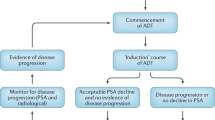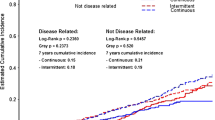Abstract
Intermittent androgen deprivation is increasingly employed as an alternative to continuous life long androgen deprivation therapy for men with advanced or recurrent prostate cancer. Two recent phase III trials have clarified the benefits of intermittent therapy. In men with non-metastatic disease with PSA recurrence after definitive local therapy, intermittent therapy showed equivalent survival to continuous therapy, with significant improvements in quality of life. Patients on intermittent therapy experience improved bone health, less metabolic and hematologic disturbances, fewer hot flashes, as well as improved sexual function. In men with metastatic disease, the data is less clear. The long-awaited results of SWOG 9324 comparing intermittent to continuous therapy in metastatic disease showed a trend to worse outcome in the patients with ‘minimal’ metastatic disease, and no difference in those with widespread bone mets. The significance of this observation is in dispute. This review also addresses practical issues in the use intermittent therapy, including patient selection, follow-up and cycling of therapy. The recent results of randomized clinical trials now establish that intermittent androgen deprivation therapy is an approach that should be considered the standard of care for most patients with non-metastatic prostate cancer requiring hormonal therapy.

Similar content being viewed by others
References
Papers of particular interest, published recently, have been highlighted as: • Of importance •• Of major importance
Huggins C, Hodges CV. Studies on prostatic cancer: I. The effect of castration, of estrogen and of androgen injection on serum phosphatases in metastatic carcinoma of the prostate. 1941. J Urol. 2002;168(1):9–12.
Mottet N, Bellmunt J, Bolla M, Joniau S, Mason M, Matveev V, et al. EAU guidelines on prostate cancer. Part II: treatment of advanced, relapsing, and castration-resistant prostate cancer. Eur Urol. 2011;59(4):572–83.
Higano CS. Side effects of androgen deprivation therapy: monitoring and minimizing toxicity. Urology. 2003;61(2 Suppl):32–8.
• Klotz LH, Herr HW, Morse MJ, Whitmore Jr WF. Intermittent endocrine therapy for advanced prostate cancer. Cancer. 1986;58(11):2546–50. The first report of intermittent androgen deprivation therapy in clinical practice.
Akakura K, Bruchovsky N, Goldenberg SL, Rennie PS, Buckley AR, Sullivan LD. Effects of intermittent androgen suppression on androgen-dependent tumors. Apoptosis and serum prostate-specific antigen. Cancer. 1993;71(9):2782–90.
Bruchovsky N, Rennie PS, Coldman AJ, Goldenberg SL, To M, Lawson D. Effects of androgen withdrawal on the stem cell composition of the Shionogi carcinoma. Cancer Res. 1990;50(8):2275–82.
Sato N, Gleave ME, Bruchovsky N, Rennie PS, Goldenberg SL, Lange PH, et al. Intermittent androgen suppression delays progression to androgen-independent regulation of prostate-specific antigen gene in the LNCaP prostate tumour model. J Steroid Biochem Mol Biol. 1996;58(2):139–46.
Chang SL, Liao JC, Shinghal R. Decreasing use of luteinizing hormone-releasing hormone agonists in the United States is independent of reimbursement changes: a Medicare and Veterans Health Administration claims analysis. J Urol. 2009;182(1):255–60. discussion 261.
• Abrahamsson P-A. Potential benefits of intermittent androgen suppression therapy in the treatment of prostate cancer: a systematic review of the literature. Eur Urol. 2010;57(1):49. An excellent overview of intermittent therapy, including a critical review of the data.
Shaw GL, Wilson P, Cuzick J, Prowse DM, Goldenberg SL, Spry NA, et al. International study into the use of intermittent hormone therapy in the treatment of carcinoma of the prostate: a meta-analysis of 1446 patients. BJU Int. 2007;99(5):1056–65.
Bruchovsky N, Klotz L, Crook J, Malone S, Ludgate C, Morris WJ, et al. Final results of the Canadian prospective phase II trial of intermittent androgen suppression for men in biochemical recurrence after radiotherapy for locally advanced prostate cancer. Cancer. 2006;107(2):389–95.
Bruchovsky N, Klotz L, Crook J, Goldenberg SL. Locally advanced prostate cancer—biochemical results from a prospective phase II study of intermittent androgen suppression for men with evidence of prostate-specific antigen recurrence after radiotherapy. Cancer. 2007;109(5):858–67.
Bruchovsky N, Klotz L, Crook J, Phillips N, Abersbach J, Goldenberg SL. Quality of life, morbidity, and mortality results of a prospective phase II study of intermittent androgen suppression for men with evidence of prostate-specific antigen relapse after radiation therapy for locally advanced prostate cancer. Clin Genitourin Cancer. 2008;6(1):46–52.
Bruchovsky N, Klotz LH, Sadar M, Crook JM, Hoffart D, Godwin L, et al. Intermittent androgen suppression for prostate cancer: Canadian Prospective Trial and related observations. Mol Urol. 2000;4(3):191–9.
Miller K, Steiner U, Lingnau A, et al. Randomised prospective study of intermittent versus continuous androgen suppression in advanced prostate cancer [abstract 5105]. Presented at: American Society of Clinical Oncology; June 1–5, 2007; Chicago, IL, USA.
Mottet N, Goussard M, Loulidi S, Wolff J. Intermittent versus continuous maximal androgen blockade in metastatic (D2) prostate cancer patients. A randomized trial. Paper presented at: 24th Congress of the European Association of Urology; March 17–21, 2009; Stockholm, Sweden.
Tunn U, Eckhart O, Kienle E, Hillger H. Intermittent androgen deprivation in patients with PSA-relapse after radical prostatectomy – first results of a randomised prospective phase-III clinical trial (AUO study AP06/95). Eur Urol Suppl. 2003;2(1):24.
Hussain M, Tangen CM, Berry DL, Higano CS, Crawford ED, Liu G, et al. Intermittent versus continuous androgen deprivation in prostate cancer. N Engl J Med. 2013;368(14):1314–25.
•• Crook JM, O'Callaghan CJ, Duncan G, Dearnaley DP, Higano CS, Horwitz EM, et al. Intermittent androgen suppression for rising PSA level after radiotherapy. N Engl J Med. 2012;367(10):895–903. This is the largest and most definitive prospective randomized trial of intermittent vs. continuous ADT in the non-metastatic setting. The findings are described in the article in detail.
da Silva FEC C, Bono AV, Whelan P, Brausi M, Marques Queimadelos A, Martin JAP, et al. Intermittent Androgen Deprivation for Locally Advanced and Metastatic Prostate Cancer: Results from a Randomised Phase 3 Study of the South European Uroncological Group. Eur Urol. 2009;55(6):1269–77.
Langenhuijsen JF, Badhauser D, Schaaf B, Kiemeney LALM, Witjes JA, Mulders PFA. Continuous vs. intermittent androgen deprivation therapy for metastatic prostate cancer. Urol. Oncol. [Internet]. 2011 May 9 [cited 2012 Mar 21]; Available from: http://www.ncbi.nlm.nih.gov/pubmed/21561791.
Gulley JL, Figg WD, Steinberg SM, Carter J, Sartor O, Higano CS, et al. A prospective analysis of the time to normalization of serum androgens following 6 months of androgen deprivation therapy in patients on a randomized phase III clinical trial using limited hormonal therapy. J Urol. 2005;173(5):1567–71.
•• Piaggio G, Elbourne DR, Pocock SJ, Evans SJ, Altman DG and CONSORT Group. Reporting of noninferiority and equivalence randomized trials: an extension of the CONSORT 2010 statement. JAMA. 2012;308(24):2594–604. This article should be required reading for anyone interested in non-inferiority trials. It outlines how results of these trials should be interpreted, and describes the pitfalls of the non-inferiority design.
de Leval J, Boca P, Yousef E, Nicolas H, Jeukenne M, Seidel L, et al. Intermittent versus continuous total androgen blockade in the treatment of patients with advanced hormone-naive prostate cancer: results of a prospective randomized multicenter trial. Clin Prostate Cancer. 2002;1(3):163–71.
Spry NA, Galvão DA, Davies R, La Bianca S, Joseph D, Davidson A, et al. Long-term effects of intermittent androgen suppression on testosterone recovery and bone mineral density: results of a 33-month observational study. BJU Int. 2009;104(6):806–12.
Malcolm JB, Derweesh IH, Kincade MC, DiBlasio CJ, Lamar KD, Wake RW, et al. Osteoporosis and fractures after androgen deprivation initiation for prostate cancer. Can J Urol. 2007;14(3):3551–9.
Strum SB, McDermed JE, Scholz MC, Johnson H, Tisman G. Anaemia associated with androgen deprivation in patients with prostate cancer receiving combined hormone blockade. Br J Urol. 1997;79(6):933–41.
Choo R, Chander S, Danjoux C, Morton G, Pearce A, Deboer G, et al. How are hemoglobin levels affected by androgen deprivation in non-metastatic prostate cancer patients? Can J Urol. 2005;12(1):2547–52.
Malone S, Perry G, Eapen L, Segal R, Gallant V, Dahrouge S, et al. Mature results of the Ottawa phase II study of intermittent androgen-suppression therapy in prostate cancer: clinical predictors of outcome. Int J Radiat Oncol Biol Phys. 2007;68(3):699–706.
Saigal CS, Gore JL, Krupski TL, Hanley J, Schonlau M, Litwin MS. Androgen deprivation therapy increases cardiovascular morbidity in men with prostate cancer. Cancer. 2007;110(7):1493–500.
Prapotnich D, Fizazi K, Escudier B, Mombet A, Cathala N, Vallancien G. A 10-year clinical experience with intermittent hormonal therapy for prostate cancer. Eur Urol. 2003;43(3):233–40.
Salonen AJ, Viitanen J, Lundstedt S, Ala-Opas M, Taari K, Tammela TLJ. Finnish multicenter study comparing intermittent to continuous androgen deprivation for advanced prostate cancer: interim analysis of prognostic markers affecting initial response to androgen deprivation. J Urol. 2008;180(3):915–20.
Scholz MC, Lam RY, Strum SB, Labarba DJ, Becker LK, Chang P, et al. Primary intermittent androgen deprivation as initial therapy for men with newly diagnosed prostate cancer. Clin Genitourin Cancer. 2011;9(2):89–94.
Studer UE, Hauri D, Hanselmann S, Chollet D, Leisinger H-J, Gasser T, et al. Immediate versus deferred hormonal treatment for patients with prostate cancer who are not suitable for curative local treatment: results of the randomized trial SAKK 08/88. J Clin Oncol. 2004;22(20):4109–18.
Studer UE, Whelan P, Albrecht W, Casselman J, de Reijke T, Hauri D, et al. Immediate or deferred androgen deprivation for patients with prostate cancer not suitable for local treatment with curative intent: European Organisation for Research and Treatment of Cancer (EORTC) Trial 30891. J Clin Oncol. 2006;24(12):1868–76.
Verhagen PCMS, Schröder FH, Collette L, Bangma CH. Does local treatment of the prostate in advanced and/or lymph node metastatic disease improve efficacy of androgen-deprivation therapy? a systematic review. Eur Urol. 2010;58(2):261–9.
Lukka H, Waldron T, Klotz L, Winquist E, Trachtenberg J. Maximal androgen blockade for the treatment of metastatic prostate cancer–a systematic review. Curr Oncol. 2006;13(3):81–93.
Benaim EA, Pace CM, Lam PM, Roehrborn CG. Nadir prostate-specific antigen as a predictor of progression to androgen-independent prostate cancer. Urology. 2002;59(1):73–8.
Sciarra A, Cattarino S, Gentilucci A, Alfarone A, Innocenzi M, Gentile V, et al. Predictors for response to intermittent androgen deprivation (IAD) in prostate cancer cases with biochemical progression after surgery. Urol. Oncol. [Internet]. 2011 Jun 10 [cited 2012 Feb 21]; Available from: http://www.ncbi.nlm.nih.gov/pubmed/21665494.
Yu EY, Gulati R, Telesca D, Jiang P, Tam S, Russell KJ, et al. Duration of first off-treatment interval is prognostic for time to castration resistance and death in men with biochemical relapse of prostate cancer treated on a prospective trial of intermittent androgen deprivation. J Clin Oncol. 2010;28(16):2668–73.
Morote J, Orsola A, Planas J, Trilla E, Raventós CX, Cecchini L, et al. Redefining clinically significant castration levels in patients with prostate cancer receiving continuous androgen deprivation therapy. J Urol. 2007;178(4):1290–5.
Perachino M, Cavalli V, Bravi F. Testosterone levels in patients with metastatic prostate cancer treated with luteinizing hormone-releasing hormone therapy: prognostic significance? BJU Int. 2010;105(5):648–51.
Figg WD, Hussain MH, Gulley JL, Arlen PM, Aragon-Ching JB, Petrylak DP, et al. A double-blind randomized crossover study of oral thalidomide versus placebo for androgen dependent prostate cancer treated with intermittent androgen ablation. J Urol. 2009;181(3):1104–13. discussion 1113.
Ward JE, Karrison T, Chatta G, Hussain M, Shevrin D, Szmulewitz RZ, et al. A randomized, phase II study of pazopanib in castrate-sensitive prostate cancer: a University of Chicago Phase II Consortium/Department of Defense Prostate Cancer Clinical Trials Consortium study. Prostate Cancer Prostatic Dis. 2012;15(1):87–92.
Di Silverio F, Sciarra A, Gentile V. Etoricoxib and intermittent androgen deprivation therapy in patients with biochemical progression after radical prostatectomy. Urology. 2008;71(5):947–51.
Scholz MC, Jennrich RI, Strum SB, Johnson HJ, Guess BW, Lam RY. Intermittent use of testosterone inactivating pharmaceuticals using finasteride prolongs the time off period. J Urol. 2006;175(5):1673–8.
Disclosure
Dr. Laurence Klotz reported receiving consultancy from Ferring, Astra Zeneca, and Sanofi Aventis and a grant from Abbott.
Author information
Authors and Affiliations
Corresponding author
Rights and permissions
About this article
Cite this article
Klotz, L. Intermittent Versus Continuous Androgen Deprivation Therapy in Advanced Prostate Cancer. Curr Urol Rep 14, 159–167 (2013). https://doi.org/10.1007/s11934-013-0325-x
Published:
Issue Date:
DOI: https://doi.org/10.1007/s11934-013-0325-x




